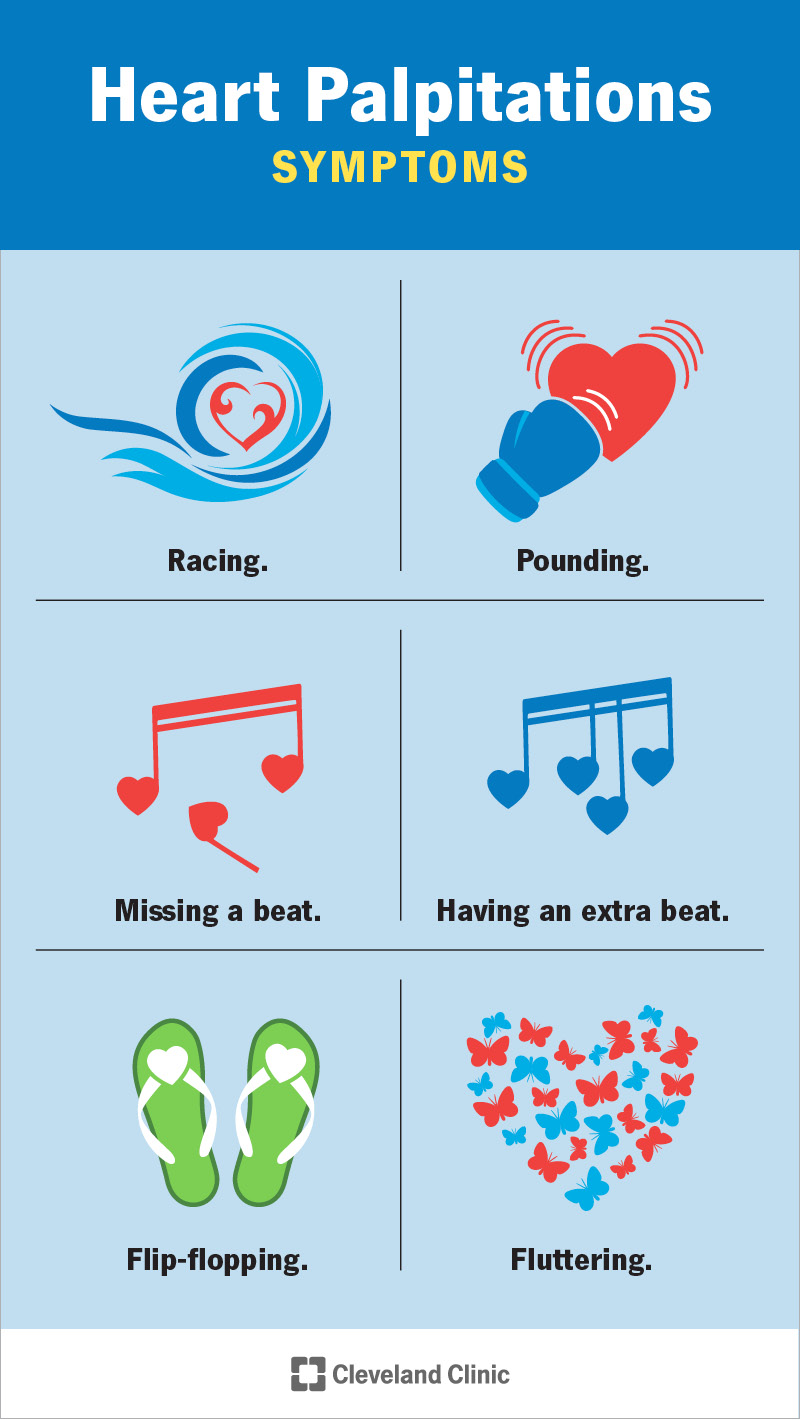Heart palpitations can feel like pounding, flip-flopping or the wrong amount of heartbeats. Most people get them because of anxiety. Other causes include: pregnancy, caffeine, alcohol or spicy food. Heart palpitations are common and usually aren’t dangerous.
Advertisement
Cleveland Clinic is a non-profit academic medical center. Advertising on our site helps support our mission. We do not endorse non-Cleveland Clinic products or services. Policy

Image content: This image is available to view online.
View image online (https://my.clevelandclinic.org/-/scassets/images/org/health/articles/17084-heart-palpitations)
Heart palpitations are a feeling like your heart is missing heartbeats, racing or pounding. You can feel palpitations in your chest, throat or neck.
Advertisement
Cleveland Clinic is a non-profit academic medical center. Advertising on our site helps support our mission. We do not endorse non-Cleveland Clinic products or services. Policy
Palpitations can happen at any time, even if you’re resting or doing normal activities. Although they may be startling, palpitations usually aren’t serious or harmful. However, they can sometimes be related to an abnormal heart rhythm that needs medical attention.
Anyone can have heart palpitations. But they're more common in females.
People can get heart palpitations at different times in their lives. You can get them as a teenager, during pregnancy or during menopause, for example.
How common are heart palpitations?
Heart palpitations are common. One study found that 16% of people saw their primary care provider because they had palpitations. Also, heart palpitations are one of the most common reasons people visit a cardiologist.
Heart palpitations symptoms may feel like your heart is:
You can feel heart palpitations in your chest, as well as in your neck or throat.
Symptoms of palpitations are more likely to be related to an abnormal heart rhythm if you have:
Heart palpitations usually don’t last long. They usually last a few seconds or minutes, but they sometimes last longer.
Advertisement
A wide variety of things can cause heart palpitations, including but not limited to:
You can get heart palpitations at different times in your life. Some people experience:
A healthcare provider will listen to your heart and lungs. They’ll also review your:
It’s helpful to let a provider know the details of your heart palpitations, such as:
You may not have heart palpitations during your visit with a provider. They may ask you to tap your fingers to imitate the rhythm of your palpitations.
A provider may order tests, such as:
You may need to see an electrophysiologist. This is a provider who specializes in abnormal heart rhythms.
The best type of treatment for you depends on what causes your heart palpitations. You may not need any treatment.
If you have heart disease or an abnormal heart rhythm, you may need medication, a procedure, surgery or a device to correct the problem. It’s important to keep all follow-up appointments with your provider.
Advertisement
If anxiety or stress causes your heart palpitations, you may be able to control them with calming activities like yoga, meditation or a mindfulness exercise that focuses on your breathing. In addition, you may need to drink less coffee or other caffeinated drinks if caffeine triggers palpitations.
Heart palpitations often go away without medical treatment if things you eat, drink or do cause them, including:
However, if you have heart disease or an abnormal heart rhythm, you may need medication, a procedure, surgery or a device to correct the issue. Again, it’s important to keep all follow-up appointments with your provider.
Heart palpitations usually aren’t a cause for concern. People who have them can go about their normal lives.
No, heart palpitations usually aren’t dangerous.
Heart palpitations are very common and are usually a normal response to stress or anxiety.
Depending on what’s causing your heart palpitations, these tips can help you have them less often:
Advertisement
Call 911 (or your local emergency number) right away if heart palpitations won’t stop or if you have these symptoms:
Contact your provider if you have palpitations sometimes, but don’t have the additional symptoms below. If your palpitations get worse or suddenly happen more often, call your provider.
Heart palpitations usually aren’t dangerous. However, they may be a sign of a more serious health problem if you also:
Questions you can ask your provider include:
Heart palpitations (feeling like your heart is racing or pounding) can be unsettling because you usually aren’t aware of your heartbeat. But heart palpitations are usually harmless. If you have other symptoms like dizziness or passing out when you have heart palpitations, that could be a sign of a serious medical problem. In that case, you should tell a healthcare provider about it.
Advertisement

Sign up for our Health Essentials emails for expert guidance on nutrition, fitness, sleep, skin care and more.
Learn more about the Health Library and our editorial process.
Cleveland Clinic’s health articles are based on evidence-backed information and review by medical professionals to ensure accuracy, reliability and up-to-date clinical standards.
Cleveland Clinic’s health articles are based on evidence-backed information and review by medical professionals to ensure accuracy, reliability and up-to-date clinical standards.
When your heart needs some help, the cardiology experts at Cleveland Clinic are here for you. We diagnose and treat the full spectrum of cardiovascular diseases.
